

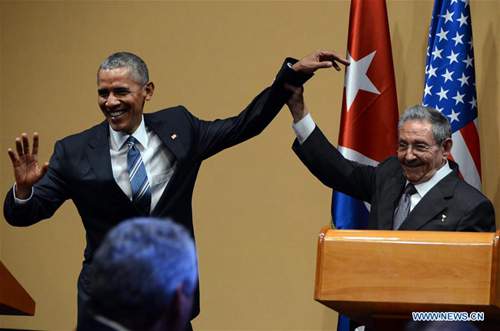 |
| Cuba's President Raul Castro (R) and U.S. President Barack Obama (L) attend a press conference at the Revolution Palace in Havana, capital of Cuba, on March 21, 2016. |
U.S. president Barack Obama kicked off his visit to Cuba last Sunday. During the trip, he and his family plan to visit Havana, watch baseball games, stroll around the ancient city, and maybe taste authentic Cuban coffee. However, the seemingly relaxed atmosphere of the visit cannot hide the complicated political calculations behind it.
First of all, Obama is trying to build a diplomatic legacy. A visit to Cuba at this time is of historic significance. The U.S. has long pursued a blockade and isolation policy toward Cuba. Although the overwhelming majority of the U.N. General Assembly asks the U.S. to lift its ban almost every year, the U.S. has always turned a deaf ear to those requests.
Since Obama was sworn in, his administration has gradually adjusted its policies toward Cuba and achieved a thaw in U.S.-Cuba relations despite stiff resistance from within the U.S. This is another successful case of “Obama Doctrine” foreign policy.
The U.S. has now entered an election year. Since Republicans took dominant seats in both the U.S. Senate and House of Representatives, it is difficult for Obama to promote liberal domestic agendas; diplomacy is one exception. For the sake of his legacy, Obama is making a real effort when it comes to U.S.-Cuba ties.
Besides concerns about his legacy, Obama is also facing impediments with regards to domestic politics. To achieve the normalization of U.S.-Cuba ties, Obama has claimed his constitutional rights as president, loosening restrictions on communication and flight access between U.S. and Cuba through executive orders.
According to the U.S. constitution, the president is entitled to great autonomy and discretion in foreign affairs, but that does not mean Obama can simply do as he pleases. The economic sanctions placed on Cuba were decided on by the U.S. Congress. To lift those sanctions also requires the approval of Congress. Meanwhile, it is not certain whether Obama’s successor will move forward with his policy.
Of course, it is likely not Obama’s intention to utilize too many political resources to end the embargo against Cuba. A few sanctions can be the leverage for future negotiations.
A third point to consider is that Obama has not changed his original intentions for policy toward Cuba. Recently, Obama’s deputy national security adviser, Ben Rhodes, said the president has made it very clear that the future of Cuba is for the Cuban people to decide; the U.S. is just trying to help any way it can.
Even so, a longstanding foreign policy strategy of the U.S. is to export American democracy and values in order to influence target countries’ policies toward the U.S. Moreover, since the introduction of the Monroe Doctrine, the U.S. has regarded Latin America as its own backyard. Any movement can be treated as a threat to the interests of the U.S.
Obama’s Cuba visit also acknowledged the failure of past U.S. policy toward Cuba. Like many countries, Cuba’s anti-U.S. sentiment was not always such a strong force. The U.S. must understand that most anti-U.S. sentiment is a result of its foreign policy. After all, as a global superpower, the U.S. must take responsibility for the significant role its actions play in the evolution of international relations.
(The author is a special commentator for People’s Daily and a distinguished research fellow with the China Institute of International Studies.)
 Thai most beautiful transgender Nong Poy release new photos
Thai most beautiful transgender Nong Poy release new photos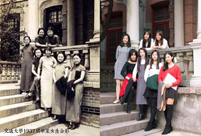 Now and then photos of Shanghai Jiaotong University
Now and then photos of Shanghai Jiaotong University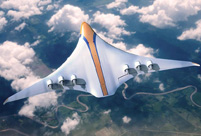 Is this what air travel will look like in 2050?
Is this what air travel will look like in 2050?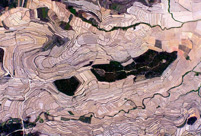 Aerial view of watermelon terraces in S China's Baise
Aerial view of watermelon terraces in S China's Baise Traditional wedding of a post-80s Tibetan couple
Traditional wedding of a post-80s Tibetan couple Models in cheongsams present classical oriental beauty
Models in cheongsams present classical oriental beauty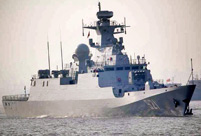 Second commissioned C28A corvette made by China enters Algerian Navy
Second commissioned C28A corvette made by China enters Algerian Navy Intoxicating Wuyuan in spring
Intoxicating Wuyuan in spring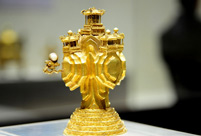 Gold and silver wares of Qing Dynasty exhibited in Shenyang Imperial Palace
Gold and silver wares of Qing Dynasty exhibited in Shenyang Imperial Palace Top 20 hottest women in the world in 2014
Top 20 hottest women in the world in 2014 Top 10 hardest languages to learn
Top 10 hardest languages to learn 10 Chinese female stars with most beautiful faces
10 Chinese female stars with most beautiful faces China’s Top 10 Unique Bridges, Highways and Roads
China’s Top 10 Unique Bridges, Highways and Roads Textbook piracy crackdown unlikely to work, greater awareness needed: experts
Textbook piracy crackdown unlikely to work, greater awareness needed: experts After two-child policy, sperm banks struggle to collect enough donations
After two-child policy, sperm banks struggle to collect enough donations Foreign investors to gain more access to China: minister
Foreign investors to gain more access to China: minister Overseas forces feed on disappearance cases to hype their rhetoric
Overseas forces feed on disappearance cases to hype their rhetoricDay|Week